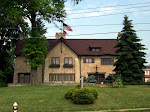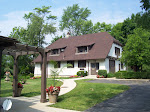 The modern game of baseball did not come to be until the mid-19th Century. The New York Knickerbockers club, founded September 23, 1845, is credited with outlining the rules for playing the game as we now know it. In the following decade, more than a dozen teams, including the Knickerbockers, formed the National Association of Baseball Players, the first organization to govern the sport of baseball and its first professional teams. In 1876, that organization was replaced by the National League of Professional Baseball Clubs. The National League, along with the American League which formed in 1901, constitutes modern Major League Baseball.
The modern game of baseball did not come to be until the mid-19th Century. The New York Knickerbockers club, founded September 23, 1845, is credited with outlining the rules for playing the game as we now know it. In the following decade, more than a dozen teams, including the Knickerbockers, formed the National Association of Baseball Players, the first organization to govern the sport of baseball and its first professional teams. In 1876, that organization was replaced by the National League of Professional Baseball Clubs. The National League, along with the American League which formed in 1901, constitutes modern Major League Baseball. While baseball became a popular professional sport, it also thrived in amateur and school leagues across America. Beginning July 12, the Arms Family Museum of Local History will show the photographic exhibit The Boys and Girls of Summer. The exhibit will feature images of local baseball teams from throughout the 20th Century. From the Rayen High School team of 1901 to the General Electric Softball team of 1976, the exhibit will show some of the teams and players that have brought our national pastime to life in the Mahoning Valley.
While baseball became a popular professional sport, it also thrived in amateur and school leagues across America. Beginning July 12, the Arms Family Museum of Local History will show the photographic exhibit The Boys and Girls of Summer. The exhibit will feature images of local baseball teams from throughout the 20th Century. From the Rayen High School team of 1901 to the General Electric Softball team of 1976, the exhibit will show some of the teams and players that have brought our national pastime to life in the Mahoning Valley.
A New Exhibit at The Arms Family Museum of Local History
Open Tuesday-Sunday from 1:oo to 5:00 p.m.
Images: Rayen High School Baseball Team, 1901; General Electric Softball Team, 1976; Youngstown Sheet & Tube Baseball Game, 1920






No comments:
Post a Comment